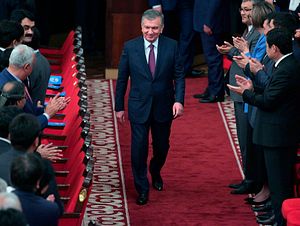Three years since Uzbekistan’s President Shavkat Mirziyoyev assumed power following the death of authoritarian leader Islam Karimov, he has taken some concrete steps to improve the country’s human rights record. In early August, in ordering the closure of the notorious Jaslyk prison – long a symbol of Uzbekistan’s torture epidemic and imprisonment of government critics – Mirziyoyev fulfilled a demand United Nations human rights bodies first issued 17 years ago.
This spring, breaking with decades of censorship of the internet, the authorities lifted a ban on several critical websites. And the government’s key representative on the media recently all but conceded that social media and bloggers are now some of Uzbekistan’s most important arbiters of public opinion.
These moves, combined with the removal of currency restrictions, easing of visa restrictions for visitors from many foreign countries, and a warming of ties with Uzbekistan’s Central Asian neighbors, have contributed to a sense of hope among many ordinary Uzbeks about the possibility for change not witnessed in decades.
At the same time, the government remains firmly authoritarian. Thousands of people, mainly peaceful religious believers, remain in prison on false charges. The security services retain vast powers to harass and detain perceived critics and genuine political pluralism seems decidedly out of reach. Outbursts of public anger about mass demolitions that are part of urban renewal projects and the resulting forced evictions across the country are posing a challenge to authorities.
Other looming human rights tests – such as parliamentary elections set for December, ongoing corruption, stamping out torture and forced labor in the cotton industry, gender inequality, and violence against lesbian, gay, bisexual and transgender (LGBT) people – will reveal a great deal about the ultimate direction the Uzbek government decides to take on its oft-repeated promises of reform.

































